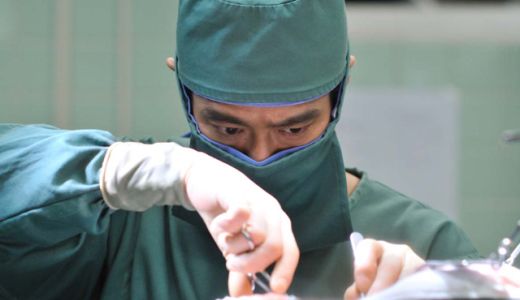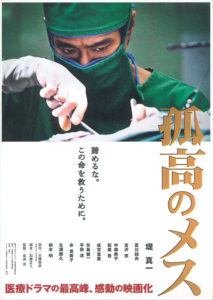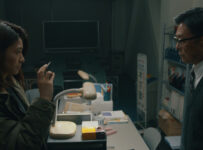The Closing Night of the 14th Japanese Film Festival in Sydney is an adaptation of Doctor Toshihiko Oogane’s bestselling novel. Drawing on the controversial topic of human organ transplant from brain-dead patients in Japan, where brain-death was not legally recognised for a number of years, it is the second film in the festival (after Dear Doctor) to deal with the Japanese health system in regional areas. Released to moderate box office success in June this year, it is an unusual choice for a closing night film. Most closing night films tend to be something a bit more lighthearted and fluffy, such as last year’s Chef of the South Pole or the often funny and beautiful Departures in 2008. So a serious dissection of the politics of organ donation was completely unexpected on the final night of what has been an excellent festival.
Hotshot Doctor Touma (Shin’ichi Tsutsumi, Villon’s Wife) arrives at a regional hospital and immediately revolutionises the way surgery is performed. The hospital, and in particular the disgruntled and disillusioned nurse Namiko Nakamura (Yui Natsukawa, Still Walking), is awakened to a new way of doing things. No longer will patients be sent to the ‘big university hospital’ for surgery, as Touma builds local confidence with a charter of putting the patient before procedure. However, this revolutionary attitude is challenged when the hospital must choose whether or not to donate the organs of a recently brain-dead patient when the mayor (Akira Emoto) suddenly collapses. With brain death organ transplants illegal in Japan, will Touma risk being charged with murder to maintain his principles?
A Lone Scalpel (孤高のメス) deals with some incredibly weighty themes, and the ‘Apply to donate’ application forms left on our cinema seats is indicative of the immediacy of the issue. Unfortunately, with A Lone Scalpel the weighty themes come coupled with a fairly heavy-handed approach, and the options between ‘right’ and ‘wrong’ are never any greyer than ‘black’ or ‘white’. Although brilliant acted as always, the character of Kimiko Yo’s (Dear Doctor, Departures) grieving mother feels like she could have stepped out of any ‘Movie of the Week’. Actually, that’s not a bad description for A Lone Scalpel: a highly ‘issues’ based movie that eschews complex drama for a simplistic depiction of a very important issue.
A Lone Scalpel is a competent film without soaring. Highlighting the problems with any health care system is a social responsibility that more filmmakers should embrace, and on one level A Lone Scalpel should be admired for discussing the importance of organ donation in mainstream Japanese cinema, especially in a nation that still has a number of taboos surrounding death (there’s another connection with Departures). However, the film’s politics are blatantly clear from the outset, and while there is some decent direction and well-executed medical sequences from Izuru Narushima, there’s little here to lift this above an average episode of E.R.
A Lone Scalpel is playing at the 14th Japanese Film Festival nationally. It is due to play again at Melbourne on 7 December 2010.






No Responses